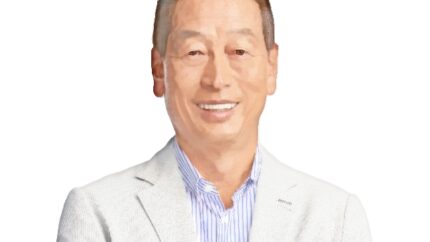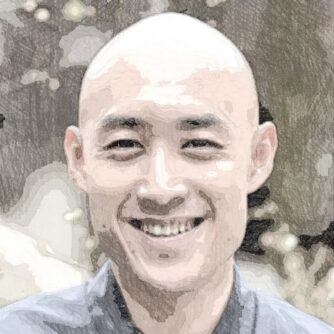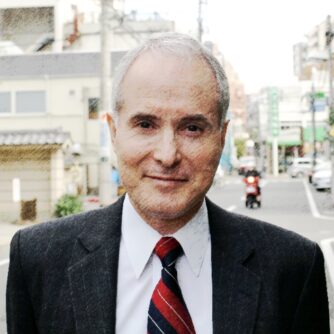In the last episode of my conversation with “Tani,” we start off with the concept of beauty. After all, Shiseido is a beauty products company, and the world is a beautiful place. Yet, there are global issues that are troublesome, and we touch upon some concerns. There are cultural differences in different parts of the world, yet culture serves as base for everything that we do. We both agreed that the younger generation has an important big role to play in our world, and we get a glimpse of what Tani would personally like to be doing in the future.
https://corp.shiseido.com/en/company/board/
Tani believes that the essence of beauty is “to do something good.” Harmony, integrity, ethics are all good. Tani also notes that the word “cosmetics” originated from the word, “cosmos.” Therefore, the essence of beauty is about creating harmony in the world, or in other words, sustainability.
Tani points out that in Japan, we use the Chinese character 美 ”bi” to express the concept of beauty in the written language in various manners.
美人 “bijin “ means beautiful person.
美術 “bijutsu” means beautiful skill, or art.
有終の美 “yushu-no-bi” means beauty of ending well, or finishing the task leads to good results.
美味しい “oishii” means beautiful taste, or delicious.
The sense of beauty maybe different from culture to culture, region to region, nationalities to nationalities. However, looking good is a common framework or common value. Thus, Tani believes beauty is a common language for people.
However, in our world, most of the population growth is in the emerging countries, whereas Shiseido’s brand recognition is primarily in the established countries. Tani admits that first, people in emerging societies don’t use any cosmetics at all. However, several years ago, Shiseido engaged in a project in Bangladesh, where they sent out a team to a remote village.
They asked the people to come to wash their face with some of their washing products. People there got really excited since they had never used such products before. Once they get used to the sensation of a clean face, they wanted to maintain that condition. When they got used to maintaining skin conditions, they started to use basic skin conditions products. The same for lipstick, eye products, and then fragrance.
As the GDP for the emerging countries rise, they can afford and therefore want to upgrade their skincare products. It takes years, and require long-term strategy, but basically, people want to feel good.
For example, when Tani visited India several years ago, he saw that there is an emergence of a prestige segment for cosmetics. Clearly there were consumers that were rich enough to buy Shiseido’s products. Therefore, he recognized that there was a need to communicate to that segment of consumers what Shiseido and the brand was all about. It is a long-term job, but an important one.
Opportunities clearly exists, but global conflicts between the “have” and “have nots,” the ongoing conflicts between China and the US, with Japan caught in the middle are risks for global companies like Shiseido. It is obvious that global peace is better than conflict. Now, recognizing that Tani is a CEO of a corporation, and not the president of the world, I asked for his views regarding the state of global affairs.
Tani admits that geo-political tensions are concerning, but his mission is not politics but rather is business, by creating trust in Shiseido’s brands among consumers. “Whatever happens, at the end of the day, that is what we do,” says Tani. In other words, creating great relationship with consumers among different parts of the world is Shiseido’s part in the state of global affairs.
When asked about any other part of the world that looks interesting to Tani, he answered the younger generation and their sense for sustainability. He points out the activities of Greta Thunberg, the young environmental activist that is really vocal and is changing the world in a positive way.
The demands are challenging for businesses. Yet, for example, Tani takes note how airline companies have started to improve aircraft to consume less energy. Probably not enough to satisfy Greta’s expectations, but it has led to new innovations in business practices, and Tani believes that this kind of healthy debate is very important.
Japan tends to be quiet in many global issues, but Tani trusts the younger people to change the world, to change the company. Tani revealed at some point in the future when he eventually “graduates” from Shiseido, that his dream is to get involved in development of younger people.
The younger generation has an important role at every point in the history of mankind. They are always more adaptable to the new world environment, which is always changing.
At the turn of the century, we didn’t have social media. Therefore, back in the 20th century, CEO of a corporation could afford to focus just on the shareholders. Now, with social media, the transmission of news and information is chaotic, coming from every angle, and top management must also keep a close eye on all stakeholders. Anything, at any time can go viral.
Tani agreed with this observation regarding the new world. He notes that in China, Shiseido engages in advertisement strategy in the internet space. Many Chinese consumers (before COVID) went travelling abroad to Japan and other places, where they buy their products at the airports. The consumers are global in this way, but even global corporations still tend to be organized geographically.
However, the consumers are becoming seamless with communication and information back and forth on the internet, where there are no walls. Therefore, Tani points out that one important challenge for Shiseido is also to become organizationally seamless in their day-to-day operations as well.
When Shiseido creating new products in Japan, they should also communicate this to the Chinese consumers, especially when they come visit. In our new world, organization should adapt to new business conditions, by looking at organization from different ways. “Old ways will become obsolete,” warns Tani.
So, what keeps Tani awake at night? Well, it turns out that he is a good sleeper. I suppose he is a good “on-off” kind of a person. Tani admits that he loves to play golf. When he is up on the tee and hitting the ball, he is focused on that. Nothing else.
However, once he starts walking on the course, his mind immediate starts to get busy, thinking about various things that he needs to do. After all, being a CEO of corporation employing 45,000 people, and therefore, their lives, is a big responsibility. Critical management issues like structural reforms and divestments, always involves the people.
Since we talked earlier about the concept of beauty, I probed Tani regarding his thoughts about culture. He felt that culture is the base of peoples’ lives. Different people in different nationalities, race and regions have different culture. But there is always an aspect of culture in everything that exists in that society.
Tani feels that the Japanese culture tends to be peculiar. So much attention is given to detail. However, this was the base for high quality automobiles produced by Japanese manufacturers. This cultural aspect led to the “Made in Japan” brand in the Showa Era.
Tani always tells a story to people from abroad how the shinkansen bullet train rolling into the station is boarded by the cleaning crew, and in less than 5 minutes, they finish their tasks and are out, with a courtesy bow to the onboarding travelers. This is Japanese culture. The other day, I was traveling on the shinkansen when there was an announcement. “We apologize sincerely for any inconveniences. The train will be 1 minute late.”
This culture of attention to detail has many positive aspects that it can also cause negative aspects as well. A “beta” products with bugs that will be corrected as the product is rolled out in the market is unthinkable for a craftsman-like precision culture. But, if a company is able to control the risks, beta products have the advantage of going to markets quickly. Japanese companies would rather not take the risk, than control it.
Tani agrees that in business of global competitors, Japanese companies need agility. The culture of checking every corner, getting everybody on the same page before implementation can be a hindrance, especially for commodity products, where speed is the key.
So, why is this fear of making mistakes, so entrenched in the Japanese culture? Tani answers that being a part of community, the sense of belonging is important for Japanese. He notes that the flip of side of having the sense of belonging is the unwillingness to stand out, being comfortable just being part of the crowd.
But for a Japanese company to be global, Tani says “we need both,” to have a sense of belonging but at the same time standing out. This sounds like need for diversity.
The most problematic barriers to diversity that still is very prevalent at Japanese corporations is hierarchical, the seniority system that is still held in place by the “life-time” labor practice. Tani responded that Shiseido introduced the job grade system. Now, whether you are man or woman, young or old, internal or external, is not the decisive factor. Someone who is most suitable should be in that position. Tani is hopeful that this shift from the old style to new work practices is really going to change the culture.
Tani is a proponent of welcoming women into executive positions. In one appointment, the new executive asked permission whether she can make a comment. It was that kind of senior/male-centric environment that she had been used to. Tani replied, “Don’t hesitate. You are here because of your comments and pushbacks.” Apparently, she has no problems in speaking out these days.
Tani reminds everybody each time, “Whatever the age, whatever the gender, you are here to share your view. That is the value.”
The concept of “ichigan” (all for one, one for all) that we discussed in the previous episode was a good word for the Showa Era, when there was a tailwind of overall economic growth in Japan. But now, Japan has to create new winds of growth, and for that, Japan needs diversity. I asked Tani, whether “ichigan” and diversity are contradictory, or are they ways to combine the two.
Tani replied that Shiseido must embrace diversity, of working together. With 45,000 employees, Shiseido is not a startup. However, Tani believes that each individual should stand out, achieving their own mission and goals. Individual development of employees is a priority for management.
At the same time, the common mission or purpose and sharing is also very important. Shiseido has been holding a global conference in January every year, where 1000 representatives from the various locations come to Japan from all over the world. In the beginning, Tani thought that sharing sales, profits and other financial targets with his people was important. Then he got some feedback.
“We are here to listen to you and to learn from you, regarding the vision of the company in getting to the next stage, together.”
So, Tani changed his tune. Financial targets were of course delivered, but Tani felt that it was his job to inspire the common value, the common vision with his people. So, in his messaging, he said nothing about the numbers. But he made a conscience effort to talk to his people.
How could Tani show to them that diversity is important, yet be sure that the people won’t be fragmented? At the end of the sessions, he got on stage, and asked everybody to stand up. Then he urged everyone to join him in shouting out “Ei-Ei-Oh ! One Shiseido!” (note: Ei-Ei-Oh was originally a call of camaraderie when samurai’s return from a victorious battle.)
The first time he tried this, many people were caught by surprise, and didn’t know what was going on. There was some resistance to such exhibition of staged camaraderie. But these days, apparently, all in attendance shout out in one voice. “We are all human beings. We want to be a part of something,” says Tani.
As we neared the close of our podcast conversation, I asked Tani about his thoughts regarding the future for Japan and the world, and specifically for him personally. What would you like to be doing at some time in the future, as he mentioned earlier, after he had “graduated” from Shiseido.
Tani saw himself in a role of encouraging the younger generation, particularly in the area of marketing and global business. Tani is a member of an international council with lots of big names, where they talk about issues such as geopolitics, global economy, and sustainability, but there is no subject related to Japan.
In one session regarding pollution in emerging countries, Tani made a comment how Japanese companies developed state of art technology to decrease pollution because of our own experiences with destroying the environment, and how Japan should be able to work with other countries with the same need.
Tani is concerned about the diminishing presence of Japan in the global community. Japan needs to tell the world what we can do, demonstrated it by sending people and deliver the kinds of value that can be offered. “If we are quiet, then things are going to fade out,” says Tani.
Many people in Japan are very set in their comfort zone. Only when people are in new environments, do the new switches come on. I asked Tani how we can encourage the younger generation to find their switch and turn them on.
Tani shared his experience as a special lecturer at his alma-mater, Doshisha University, where he talked about global business and marketing, and how we can make our world a better place through business. Some students came up to him after his lecture because they were so inspired that they wanted to talk more with Tani to find out what they themselves can do.
So, Tani agreed to make some time for them, and the students visited him back in Tokyo. They proposed to create a student community from various universities, about a 1000 students, and hoped that Tani would engage with them actively, not a lecture, but more in the style of Michael Sandel. Tani agreed. He bought Michael Sandel’s video “Justice,” and when the day arrived, Tani took off his jacket at the stage and went down into lecture hall with the students.
“Why are you here today. What is your dream. What do you want to do in the future.”
One student raised her hand. “I never thought about it. You are reminding the importance of thinking about it.” Bursting into tears, she says “I want to be a contributor to society. I have no idea what may vocation I will be pursing. But from today, I will start thinking about it.”
At the beginning everybody was quiet. But once hands started to rise, hundreds of students joined in to ask questions to Tani.
One student told Tani, “I just finished my job hunt and is suppose to start work next year. But, I am going to cancel it. I am going to the US. I don’t know what I am going to do there, but I will go.” Several years later Tani found out that he really did what he said he was going to do.
Another student said, “I may go to join Grameen Bank (in Bangladesh, founded by the Nobel Peace Prize Laureate, Muhammad Yunus, “father of microfinance”).” And, he did it. Later, he showed Tani his activities in the villages.
So, Tani is not going to be hopeless about the future, and his message to the younger generation is simple. “Go Global.”
“Go take a look at something you have never seen,” urges Tani. In business, people are expected to come up with new ideas. When Tani hires younger people, he wants to hear about something that he doesn’t know about, something that goes beyond his imagination.
“Create your own enriched experiences and character.” says Tani. Changing jobs for different companies okay since he did that himself. Staying in one company is okay as well, but that person should go abroad to work with other people in other countries.
“Go global. Enjoy the different culture, language and interaction with people.” This was Tani’s beautiful closing message to the younger generation.



